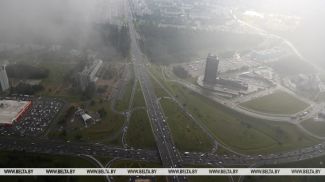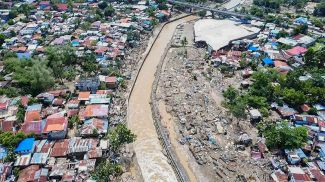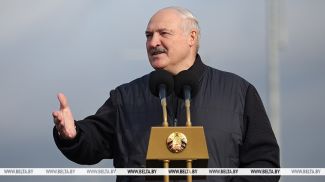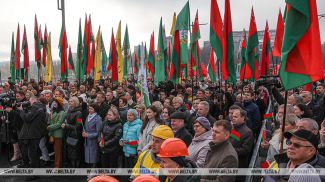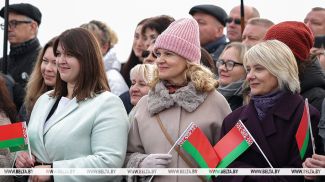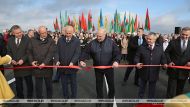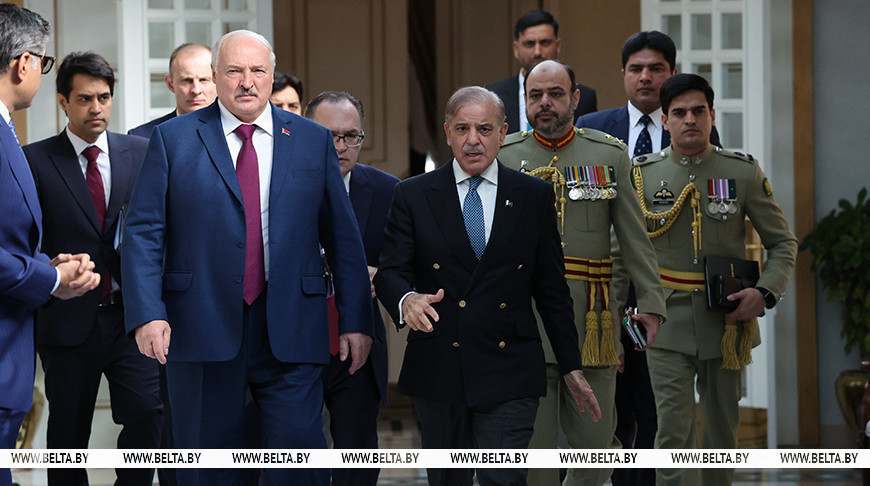
News of the story
"President's Week"
The Belarusian president's schedule is always packed with events. Aleksandr Lukashenko holds working meetings to discuss the country's most pressing issues, regularly visits the regions, makes foreign visits and hosts foreign guests, communicates with journalists, signs decrees and laws. And even when there are no public events, this does not mean that the head of state is not busy. However, even during his leisure time, be it a hockey match or chopping wood, Aleksandr Lukashenko occasionally finds a reason for another instruction. As he likes to say, decisions should be based on the reality on the ground.
The President’s Week project is intended for those, who want to keep up with the head of state, be up-to-date on the latest statements and decisions of the Belarusian leader.
The past week's schedule was unique in a way, because the head of state spent most of the time abroad: he had two foreign visits in a week - an official visit to Pakistan and a working visit to Kazakhstan for the CSTO summit.
Aleksandr Lukashenko arrived in Pakistan at a difficult time when the country was gripped by protests staged by the local opposition. Nevertheless, the host country guaranteed security, and the negotiations turned out to be quite successful. The success of the talks was attributed to a large extent to the good relations built by the leaders of the two countries. And this, one might say, is already a family tradition. It is not surprising that on the final day of the visit, Aleksandr Lukashenko had a very cordial, homely meeting with members of the family of Pakistani Prime Minister Shehbaz Sharif, including former Pakistani Prime Minister Nawaz Sharif, the brother of the current Prime Minister. “I have not seen my father so happy for a long time. And all because he is meeting with you, Mr. President,” noted Nawaz Sharif's daughter.
After that the Belarusian president headed for Astana, the capital of Kazakhstan, that hosted the CSTO Collective Security Council meeting on 28 November. Belarus is a consistent supporter of this military-political organization, but Aleksandr Lukashenko's speech at the summit touched issues of the global scale. He suggested building a new security architecture on the entire Eurasian continent, proposed to hold a large international meeting in Belarus, and put forward initiatives in the area of control of new types of weapons. The use of the new Russian missile system Oreshnik did not go unnoticed by the meeting participants.
Traditionally, during the week, Aleksandr Lukashenko sent a number of congratulatory messages both within Belarus and abroad.
The head of state congratulated the staff of the women's magazine Alesya on the magazine's 100th anniversary.
Aleksandr Lukashenko congratulated Yamandu Orsi on his election as President of Uruguay; President of the Islamic Republic of Mauritania Mohamed Ould Ghazouani on Independence Day; and President of the State of Palestine Mahmoud Abbas on the International Day of Solidarity with the Palestinian People. On behalf of the Belarusian people and himself, the head of state sent greetings to the people of Romania on the occasion of the country's National Day.
The president also congratulated People's Artist of the RSFSR Galina Polskikh on her birthday.
IN THE FAMILY CIRCLE. Highlights and outcomes of Lukashenko's official visit to Pakistan
Belarusian President Aleksandr Lukashenko paid an official visit to Pakistan in the last week of the autumn. It was a long-anticipated visit, so it drew a lot of attention. What did the leaders of Belarus and Pakistan discuss and what agreements did they reach during the negotiations? What brilliant proposal did Prime Minister Shehbaz Sharif put forward and what advice did Aleksandr Lukashenko offer to the Pakistanis outside the official framework? The answers are below.
The situation in Pakistan on the eve of the president's visit
The head of state's visit to Islamabad was taking place at a very turbulent time. It became known the day before that the Pakistani opposition was going to stage a protest, so the city was bracing for possible unrest. However, the Belarusian side did not back down and chose not to postpone the visit. Moreover, Aleksandr Lukashenko is known for his determination; he is not afraid even of NATO bombers [a reference to his trip to Belgrade in 1999].
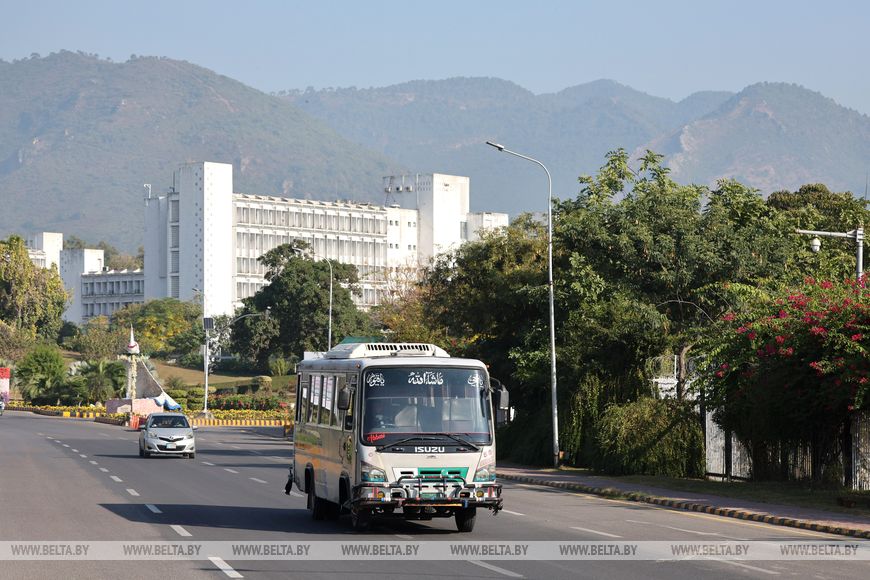
Agreements reached at the Belarus-Pakistan Business Forum
A big Belarusian delegation consisting of ministers and company heads arrived in Islamabad the day before the presidential visit. They held meetings with their counterparts and consolidated the agreements reached at a joint business forum. While on the plane to the Pakistani capital, they reread their presentations and draft agreements. Some enterprises were eyeing huge contracts.
On 25 November, a Belarus-Pakistan Business Forum was held in Islamabad. Almost three dozen Belarusian companies and about a hundred Pakistani businesses took part in it.
“We have something to offer our Pakistani partners. Today, the Republic of Belarus is a strong state with a powerful industry and well-developed agriculture, with a wide transport and logistics potential. Most importantly, the well-being of its people is continuously improving,” said Mikhail Myatlikov, Chairman of the Belarusian Chamber of Commerce and Industry (BelCCI).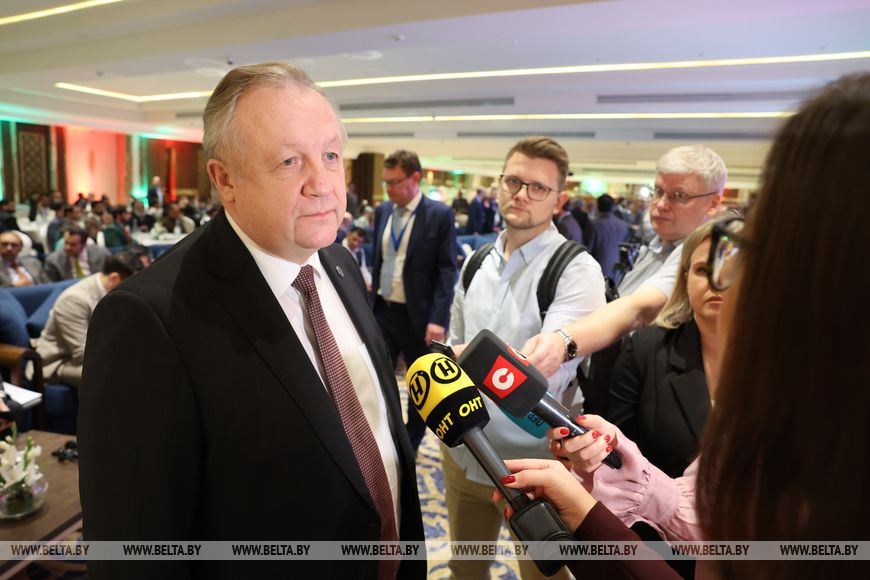 According to him, Belarusian enterprises reached agreements worth $17 million at the business forum in Pakistan. In general, in 2023 Belarusian export to Pakistan rose by 150% over 2022. This year, growth continued: it rose by 30% in H1 year-on-year. The total trade between the countries in 2023 amounted to almost $50 million.
According to him, Belarusian enterprises reached agreements worth $17 million at the business forum in Pakistan. In general, in 2023 Belarusian export to Pakistan rose by 150% over 2022. This year, growth continued: it rose by 30% in H1 year-on-year. The total trade between the countries in 2023 amounted to almost $50 million.
 According to him, Belarusian enterprises reached agreements worth $17 million at the business forum in Pakistan. In general, in 2023 Belarusian export to Pakistan rose by 150% over 2022. This year, growth continued: it rose by 30% in H1 year-on-year. The total trade between the countries in 2023 amounted to almost $50 million.
According to him, Belarusian enterprises reached agreements worth $17 million at the business forum in Pakistan. In general, in 2023 Belarusian export to Pakistan rose by 150% over 2022. This year, growth continued: it rose by 30% in H1 year-on-year. The total trade between the countries in 2023 amounted to almost $50 million.
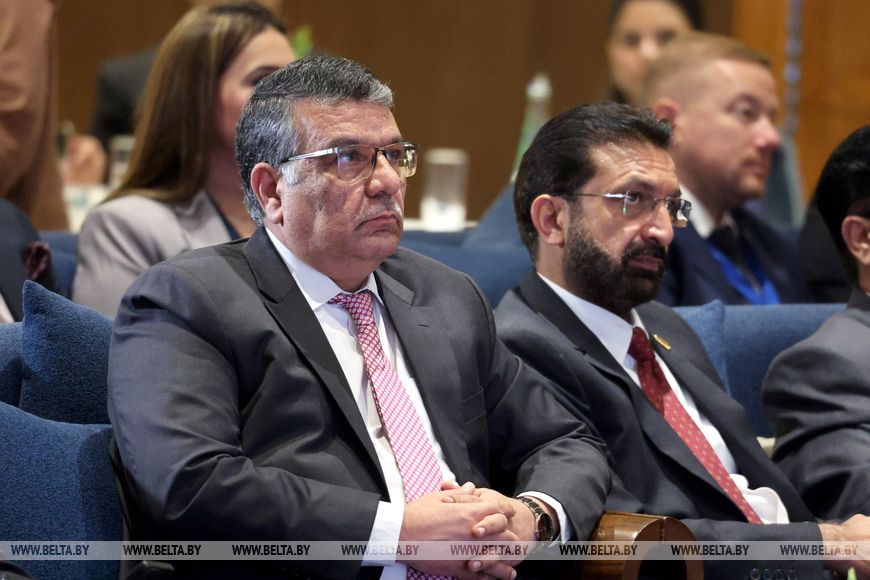
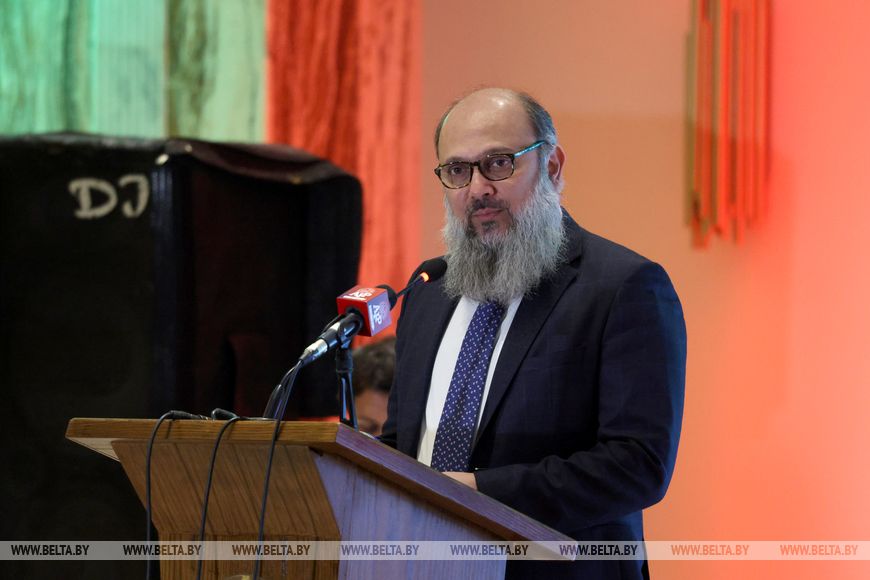
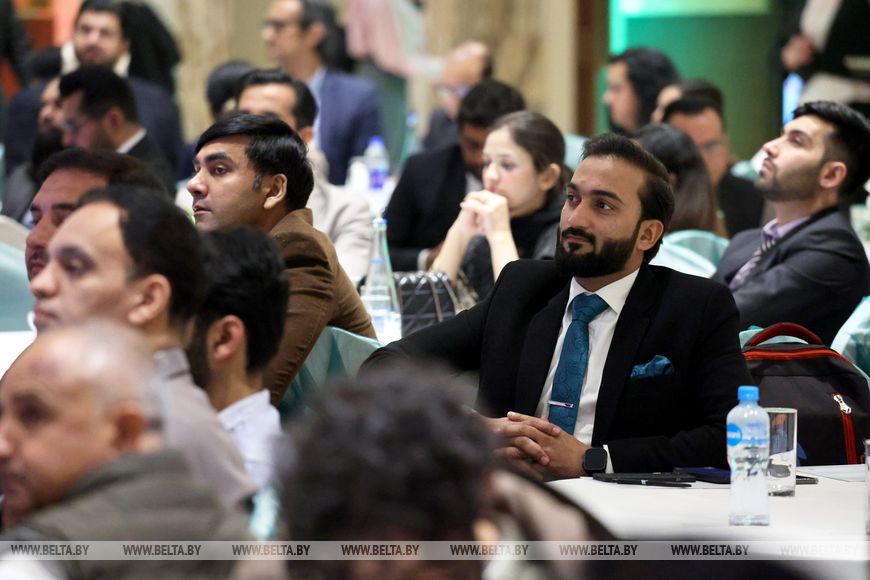
Welcome ceremony for the Belarusian president in Pakistan
On the evening of 25 November, the Belarusian air force one landed in Islamabad. The plane of the head of state touched down at the Nur Khan military base. In addition to military purposes, the base is used to receive aircraft with official foreign delegations.
In the airport the head of state was welcomed by Pakistani Prime Minister Shehbaz Sharif.
Three dozen soldiers of the guard of honor lined up along the red carpet. The welcome ceremony was accompanied by welcoming volleys from artillery guns. This tradition is not only considered good manners, but also speaks of the friendly attitude of the host party.
Islamabad prepared thoroughly for the visit of the Belarusian president. The capital city was decorated with Belarusian national symbols and posters with portraits of Aleksandr Lukashenko and the top leadership of Pakistan. The posters read the following in Belarusian and English: “Mutual respect, trust and partnership”, “Building bridges for prosperous future”, “Partners in progress and prosperity”, “New era of cooperation”.

Talks between Lukashenko and Sharif
The following day, before leaving for the residence of the Pakistani prime minister, Aleksandr Lukashenko held a protocol meeting with Deputy Prime Minister - Foreign Minister Mohammad Ishaq Dar of Pakistan in Islamabad. In accordance with the official protocol of Pakistan, the foreign minister briefed the Belarusian president on the key points of the visit program and the state of bilateral relations.
“As with other countries, no topics are off limits with Pakistan. We are ready to cooperate with you in all areas that are of interest to you, from agriculture to the defense industry. Belarus has everything to meet the needs of the people of Pakistan (the fifth most populous country in the world) in food, footwear, clothing, and so one. The main thing now is to move from memoranda to specific agreements and contracts and implement them,” Aleksandr Lukashenko said.


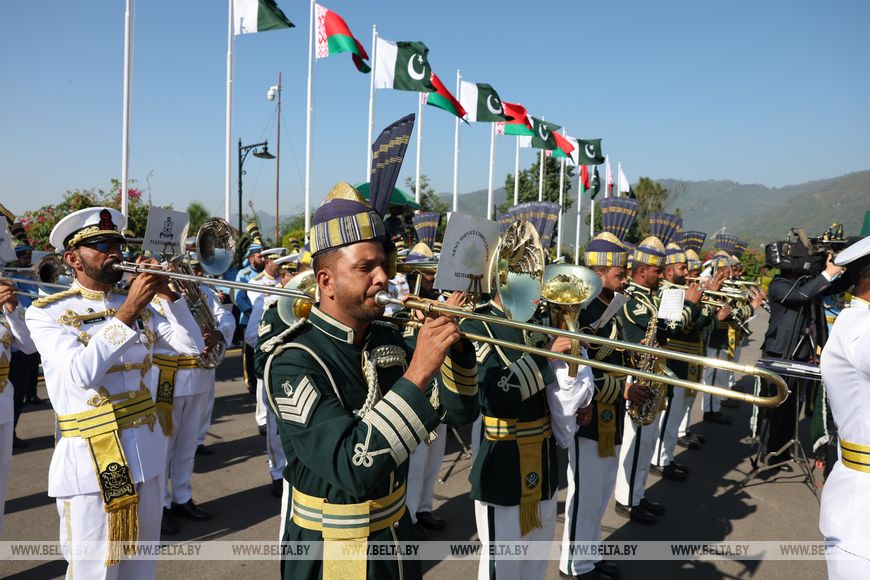

After the meeting with the foreign minister, the head of state went to the official residence of the prime minister. Shehbaz Sharif welcomed the Belarusian leader at the entrance to the residence.
The talks were preceded by an official welcome ceremony with the participation of the guard of honor and the performance of the national anthems. After that Aleksandr Lukashenko and Shehbaz Sharif planted a tree on the grounds of the residence before heading to a narrow-format meeting.
The leaders shared some details of their meeting during the broader-participation talks attended by the two delegations.
The prime minister stressed that the Belarusian leader is a great friend of Pakistan and the parties have already been able to discuss a number of pressing and important issues in a one-on-one format. “You are a man of action, so today we will try to talk less and do more,” Shehbaz Sharif said.
According to him, Pakistan is interested in Belarus' technologies in heavy industry, mechanical engineering, and agriculture, among others. “We produce agricultural products, textiles, and these industries need technologies. Belarus can provide us with such technologies. We believe that your great country can help Pakistan in many ways achieve its goals,” the prime minister said.
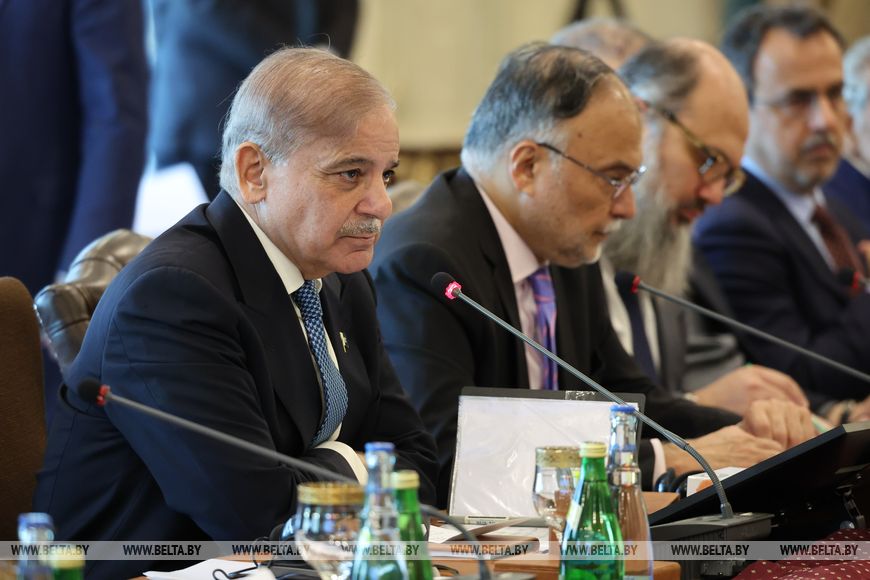
He suggested that members of the delegations discuss in detail promising areas of cooperation so that no agreements will remain just on paper.
“We are not a giant country and we have never been prone to megalomania. But we were part of the Soviet Union, which was a high-tech country. From it we inherited good technologies that we have recently built on. I am sure that the technologies that we possess will find their use in Pakistan,” Aleksandr Lukashenko stressed.
According to him, the parties agreed to take stock of relations and to get better acquainted with each other's capabilities. “I invite your ministers and specialists, heads of companies to come to Belarus, take a look at our capabilities and see what they need. There are no closed topics,” the president said. “I absolutely agree with you that after our broad meeting our ministers should discuss our plans in greater detail, for example, our industry ministers,” he noted.
The head of state set the task to develop proposals from the Belarusian side and submit them for consideration. “I just want all ministers in my delegation to bring back a portfolio of interesting projects or at least one or two projects from Pakistan. All trips must be productive. We need practical steps. Therefore, ministers need to meet face to face today, tomorrow, as much as you need, and reach agreements,” the Belarusian leader stressed.
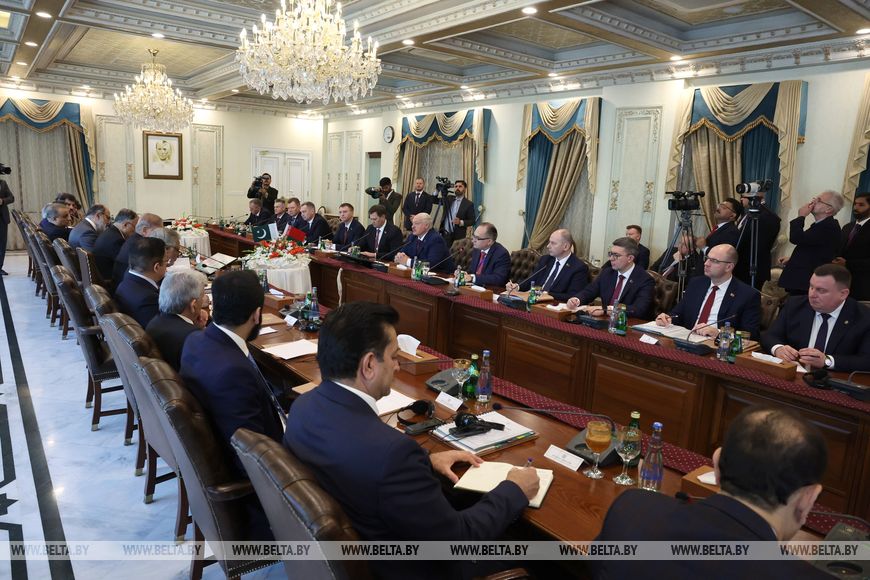
He stated that Belarus and Pakistan have excellent political relations, but trade and economic cooperation lags behind, despite the fact that the countries need each other.
“We are very interested in your proposal on a transport corridor, especially now. We will consider your proposals on visa-free travel. The minister of foreign affairs knows our policy very well. I think that we will not have any big problems here either,” Aleksandr Lukashenko said.
Aleksandr Lukashenko pointed out that he is well informed about the situation in Jammu and Kashmir. The uncertain status of this territory has been the cause of the conflict between Pakistan and India for a long time.
“[Former Prime Minister of Pakistan] Nawaz Sharif showed me this territory from his house. We are strongly against the escalation of the situation between the neighboring states. We will support you in this regard. You should come to a peaceful resolution of this issue,” the president emphasized.
Agreements reached
Following the talks between Belarusian President Aleksandr Lukashenko and Prime Minister of Pakistan Shehbaz Sharif, a comprehensive cooperation roadmap for 2025-2027 and over a dozen documents were signed.
The roadmap was inked by the co-chairs of the Belarus-Pakistan intergovernmental commission on trade and economic cooperation - Belarus' Energy Minister Aleksei Kushnarenko and Pakistan's Minister of Commerce Jam Kamal Khan.
“During the visit, the enterprises of the Industry Ministry carried out a big amount of work and reached the signing of important contracts. We plan to set up two assembly plants for tractors. It will be a model range up to 60hp and over 100hp, both of which are in great demand in the Pakistani market,” Industry Minister Aleksandr Yefimov said.
A tractor is just a tool for field work, he said. “We agreed to go further and offered Pakistani partners to organize a joint venture for the production of trailed, mounted farm machinery, which together will make it possible to perform the whole range of technological works,” Aleksandr Yefimov said.

The governments of Belarus and Pakistan have concluded an agreement on international road transport. This agreement defines the procedure for international road transportation of passengers and cargo, the conditions for mutual exemption of carriers from customs duties, taxes and fees related to the use of means of transport.
The international agreement will promote cooperation between Belarus and Pakistan in road transport and facilitate the export of road transport services to Pakistan and neighboring countries.
According to Aleksei Lyakhnovich, logistics with Pakistan is complicated, as goods are delivered by sea through the Russian ports in St. Petersburg.
“We expect results from the agreement, because we come to the south of Pakistan by sea, and will be reaching the north of Pakistan by road,” the minister explained. “This year Belarus joined the memorandum of understanding on the development of the corridor Belarus-Russia-Kazakhstan-Uzbekistan-Afghanistan-Pakistan. Today's agreement is a continuation of that memorandum. Road transport is more expensive than sea transport, but at the same time it moves much faster, in fact half as fast as sea transport.”
Joint statement by Aleksandr Lukashenko and Shehbaz Sharif
Aleksandr Lukashenko and Shehbaz Sharif took stock of the talks in the joint statement.
According to the document, the two leaders reviewed the entire spectrum of bilateral relations and reaffirmed mutual commitment to deepening friendly ties between the two countries in political, trade and economic, cultural, social and other areas.

“Pakistan and Belarus are marking the 30th anniversary of diplomatic relations this year. The parties recognized that their relations had developed into a strong, wide-ranging and comprehensive partnership of growing importance,” the document reads. “During the meeting the two leaders emphasized the importance of promoting political dialogue and strengthening inter-parliamentary relations.”
Attention was also focused on expanding trade and economic cooperation, implementation of a joint approach to regional economic integration and connectivity, and improvement of the legal framework to facilitate bilateral cooperation.
“Recognizing the advanced agricultural production capabilities of Belarus and the needs of Pakistan's agriculture-based economy, the parties agreed to promote joint ventures in the agricultural and industrial sectors, including for the production of high-tech and large-size agricultural machinery,” the statement reads.
The parties agreed to cooperate in automotive sales, production and maintenance service, including through partnerships between private and public organizations in the two countries. The initiative is aimed at capitalizing on the strengths of both countries in automotive production and technology and stimulating industrial growth.
Aleksandr Lukashenko and Shehbaz Sharif also discussed important regional and international issues. Pakistan representatives briefed Belarus on the situation in Jammu and Kashmir. The parties emphasized the need to settle all international disputes by peaceful means and in accordance with the UN Charter and UN Security Council resolutions.
Aleksandr Lukashenko and Shehbaz Sharif called for an immediate and permanent cessation of hostilities without preconditions in the Gaza Strip and Lebanon.
“Both leaders expressed deep concern over the escalation of the conflict in the Middle East, which has led to a devastating humanitarian crisis and significant civilian casualties in the Gaza Strip and Lebanon. The parties called for an immediate and permanent cessation of hostilities without preconditions in the Gaza Strip and Lebanon, end of strikes on the territory of the Syrian Arab Republic, ensuring the uninterrupted and safe delivery of humanitarian aid, restraint amid the threat of expansion of the conflict zone, and stressed the need to intensify efforts to achieve peace, stability and security for the entire region,” the document reads.
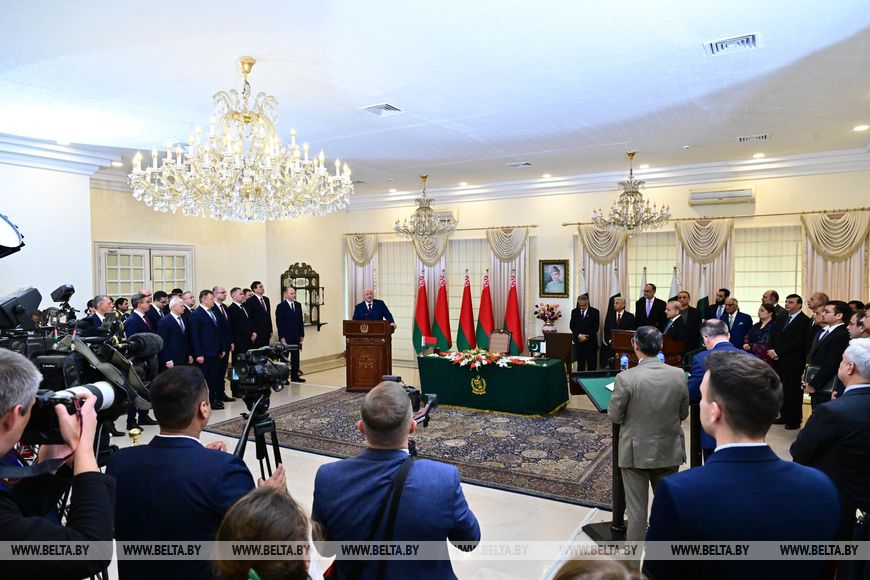
In the joint statement, the parties reaffirmed their commitment to the right of the Palestinian people to self-determination and the establishment of an independent Palestinian State on the basis of a two-state solution in accordance with the resolutions of the Security Council and the General Assembly of the United Nations.
Aleksandr Lukashenko and Shehbaz Sharif also stressed the paramount importance of a peaceful settlement of the conflict in Ukraine, the need for diplomatic efforts and constructive dialogue. They noted that the ongoing conflict has far-reaching implications not only for the region, but also for global stability and security.
“Both leaders called on all parties involved to prioritize negotiations and peaceful means to resolve all major issues, reaffirming their commitment to supporting initiatives that contribute to lasting peace and stability in the region,” the joint statement reads.

Why Belarus and Pakistan need a new roadmap
“While preparing for this meeting, I thought that memoranda are a good thing. They outline our intentions to develop cooperation. But we need agreements and contracts. The prime minister of Pakistan, as if he read my mind, told me word for word: ‘Look, it was a good idea to sign memoranda, but we need agreements and contracts. Let's meet in Minsk and sign these agreements and contracts in furtherance of the memoranda reached today. A brilliant proposal!” Aleksandr Lukashenko told the media after the talks.
The president recalled that Belarus and Pakistan have been cooperating for 30 years and have already done a lot. Why do the countries need a new roadmap then? “We need an updated, modern roadmap. We need to discard what does not work and what we do not need today in the changing world,” he explained. “Pakistani specialists know Belarus quite well, but it is advisable to learn more about modern Belarus. Shehbaz Sharif said that his specialists are ready to come to Minsk in two weeks to review some agreements and contracts. He is also willing to visit us in February, and we will sign the relevant agreements and contracts in furtherance of our current intentions. This is a good plan.”
“Today we have also highlighted the main fact about our relations. We have excellent diplomatic ties. We share the same vision for the international agenda. But our trade and economic cooperation is lagging far behind and falling short of the potential. We need to monetize our political relations and deepen economic cooperation” Aleksandr Lukashenko stressed.
The advice Lukashenko gave to the Pakistani people
The head of state remarked that apart from official statements, he would like to address the Pakistani side with one personal proposal.
“We have been maintaining relations for three decades. I have been president just as long. For me Pakistan is not some distant country. It is our very close friend. More than 10 years ago we once agreed to intensify our relations, and we have done a lot over this time. We do care about what is going on in Pakistan. We were greatly concerned when the terrible flood happened. We are deeply saddened when something happens that should not happen in your society. We are also worried about the things that are taking place today,” Aleksandr Lukashenko said.
He pointed out that the world is going through the most monumental changes in the last few centuries. “The world is very turbulent and changes every day. In this difficult time, in order to survive, countries need to stay united and their people need to really care about their homeland. We are witnessing the re-division of the world: strong, rich countries are locked in this fight. Over 50 wars and conflicts are flaring up today. There is a fierce struggle for leadership today, tomorrow and in the future. Being a giant country that has the world's fifth largest population you were also dragged into this whirlpool. Pakistan's position on the international arena is very clear. You know what Pakistan wants. But what you want is not the same what these large countries want that are fighting for leadership,” the head of state said.
The president recalled that the United States, England, India, and Australia (with Japan and South Korea probably joining them in the future) want to create a kind of “Pacific NATO”.
“Pakistan, which wants to live peacefully, may not be interested in this. Therefore, there will be attempts to destabilize your country, to foment tensions. My message to the people of Pakistan is the following: Take good care of your country. If you keep it intact, you will have a place to live. Otherwise, there will be trouble. This is my friendly advice to you,” the Belarusian leader concluded.
How did another round of protests in Pakistan end?
On this day the situation in Islamabad was developing rapidly. The opposition entered Islamabad. The protesters reached the so-called Red Zone, which houses most government buildings, embassies and offices of international organizations. Police tried to stop them using tear gas.
According to the information published in the media, about 120 law enforcement officers were wounded, over a dozen were killed in the clashes. The Pakistani authorities identified an interesting trend: out of every 100 protesters arrested, about 25 were nationals of Afghanistan. A reasonable question is: Was it the Pakistani opposition that came to the protests?
The city calmed down by Wednesday. But law enforcers still stayed alert.
"As for the president's advice to our Pakistani friends, it can be put like this: do not riot, do not go out and stir up trouble against the current government, but rather stay united with the current government, which really cares about the interests of the people, do your job and thus contribute to your country’s development and progress. Then in the future Pakistan will really have a well-deserved place in the system of international relations and will be prosperous, and not stand with a begging bowl to the collective West, which is what the collective West, in fact, wants,” Belarusian Minister of Foreign Affairs Maksim Ryzhenkov said.
Negotiations with the Pakistani prime minister were an important, but not the only point in the program of the president's visit. Aleksandr Lukashenko had an informal lunch with Shehbaz Sharif at his family residence in the resort town of Murree. The Belarusian head of state met with members of Shehbaz Sharif’s family, including former Prime Minister Nawaz Sharif.

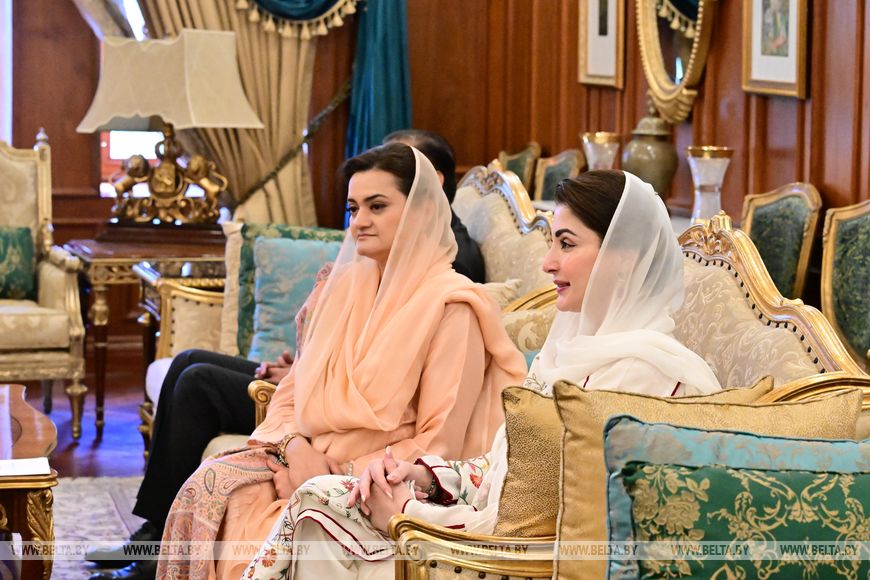
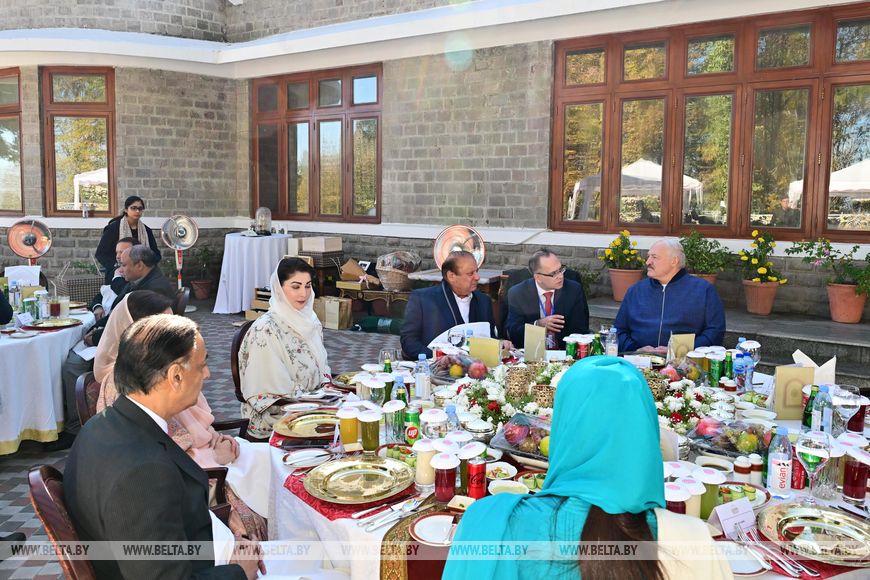
Moreover, the Belarusian president met with General Asim Munir, Chief of Army Staff of Pakistan. It was a closed meeting.
The Belarusian president completed the official visit to Pakistan. The countries seek to monetize the high level of political cooperation. Time will tell whether the two countries will succeed. But we do know that Belarus and Pakistan are committed to working hard.
GLOBAL INITIATIVES. The president's proposal to build a new security architecture in Eurasia
On 28 November, Belarusian President Aleksandr Lukashenko took part in the summit of the Collective Security Treaty Organization (CSTO) in Astana, the capital of Kazakhstan. The event itself was relatively short. Aleksandr Lukashenko worked in the Astana Palace of Independence for four and a quarter hours. But during this time a number of important statements and initiatives were made and over a dozen documents were signed.
Interestingly, in previous years the media might not have reported a speech by Aleksandr Lukashenko at all unless the forum was held in Belarus. Narrow-format meetings at CSTO summits have the press only for the first couple of minutes. Everything is limited to a brief introductory speech by the host of the summit (in the latest case, the president of Kazakhstan). The plenary session is addressed, as a rule, only by the chairman and the head of state that takes over the chairmanship for the next period. Then the CSTO secretary general briefs the heads of state about the list of documents to be signed. This is it.
There is nothing surprising about this practice, because the leaders of the countries discuss security matters which are usually not made public. But in the past few years the summit protocol became more liberal: the presidential press pools are now allowed to film the speech of their leader. It is either televised or not. It depends on the decision of a particular head of state. Since Aleksandr Lukashenko has never shunned away from the press, media interest in CSTO summits is growing not only in Belarus, but also abroad.

The CSTO is not a bureaucratized organization, in contrast to the UN Secretariat that the Belarusian head of state recently criticized at the climate summit in Baku. There are no regulations. You can deliver a speech (however long) and touch on the items you think important. In general, there is something to listen to and, most importantly, something to pay heed to.
About Armenia’s ‘freeze’
Unfortunately, the CSTO has not been meeting in full strength lately. The current summit was attended by five heads of state out of six member countries. Those were the presidents of Belarus, Kazakhstan, Russia, Tajikistan and Kyrgyzstan.
Astana would have been happy to see Armenian Prime Minister Nikol Pashinyan, but earlier he announced that Armenia had frozen its participation in the CSTO. The reason is obvious. He expected a more active involvement of the organization in the situation around the conflict with Azerbaijan.
However, there is nothing to hold against the partners, especially Russia and Belarus. They did a lot for a peaceful settlement over the years! But they placed the main emphasis on political and diplomatic means, because Azerbaijan is not an alien country for the CSTO but a partner in the Commonwealth of Independent States. Was it in the interests of the CSTO to fan the fire of the conflict that might have dragged many countries? It would be a grist to the mill of the West who acts on the premise ‘the worse things in the post-Soviet space are, the better it is for them’. A striking example is Ukraine.
As a result, history put everything in its place. Yerevan and Baku are close to concluding a peace agreement, and the leaders of these countries communicate quite normally meeting on the sidelines of various international forums. But Nikol Pashinyan would not attend CSTO summits.
Aleksandr Lukashenko first of all noted the absence of his colleague. Usually the leaders of the countries speak in alphabetical order according to the names of countries, and Nikol Pashinyan should have been first to take the floor. “Today I have the honor to speak first, since our Armenian colleague is not in attendance. This, by the way, characterizes the current geopolitical situation in the region and, to some extent, our organization,” the Belarusian leader said.
However, Armenia has not yet withdrawn from the CSTO and, as they say, does not mind the organization taking necessary decisions in its absence.
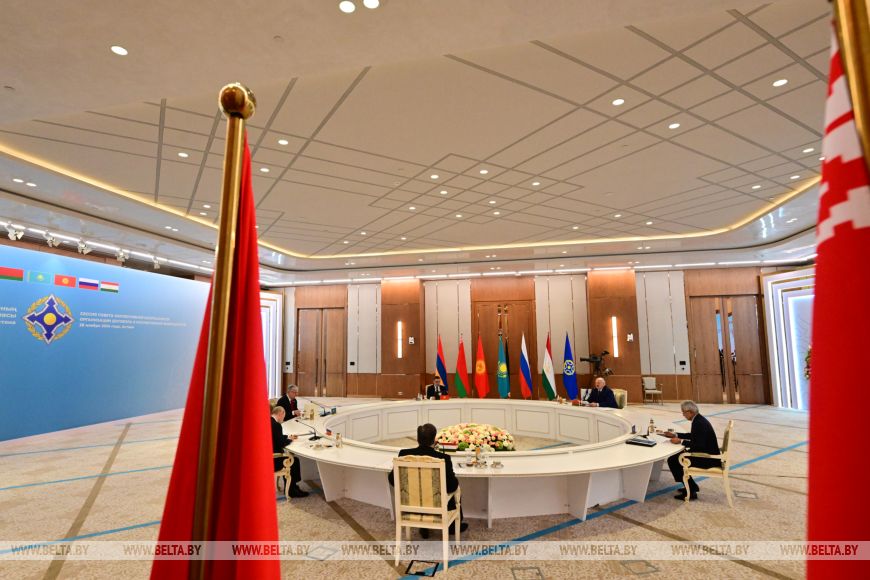
“Armenia’s position does not contradict the procedure of adopting documents. It is sad that one of the CSTO members will not be at the meetings today. But I think that the general format of the event and the documents to be considered today will not be significantly affected by this,” State Secretary of the Security Council of Belarus Aleksandr Volfovich told BelTA before the summit.
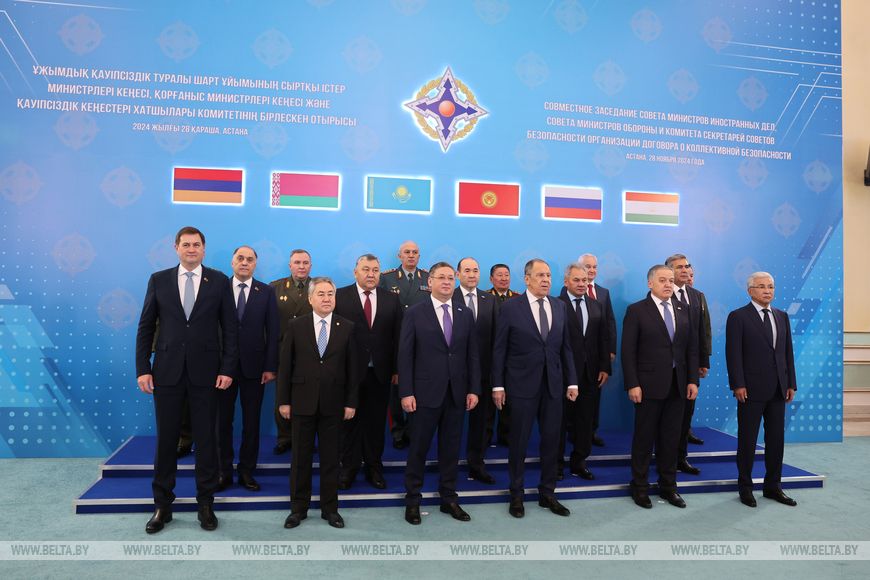
At the end of the forum, CSTO Secretary General Imangali Tasmagambetov sounded hope that Armenia would return to cooperation: “We believe that Armenia has been and remains our ally. We hope that Armenia will return to full participation in the CSTO in the foreseeable future”.
Later, Russian President Vladimir Putin also admitted that Armenia will return to full participation in the CSTO. At least, it has not yet announced its withdrawal from the CSTO and supports all the documents of the summit.
On NATOfication of Europe and the world
Mentioning Armenia, Aleksandr Lukashenko turned to global issues. “We record the worsening global situation every year. The problem is not even that the system of checks and balances, which ensured international security and strategic stability, has faded into oblivion. We have been long hesitating to develop alternative legal mechanisms,” the head of state said.
In his words, someone needs this state of affairs, when the norms and principles of international law are replaced by some subjective and arbitrarily changing rules, instruments of military and information blackmail.
This was a case when everyone at the table clearly knew and understood who benefited from it, and Aleksandr Lukashenko even hinted at the specific beneficiaries: “Against this background, the arms race is rapidly gaining momentum. The Eastern European region, especially Poland, continues its militarization. NATofication of Europe and the world in general is underway.” We will dwell on it further on.
It is obvious that the West is in no hurry to get rid of militarism, quite the opposite. “Clinging to an elusive dominance, the West is increasingly speaking the language of arms, turning a blind eye to the threats of nuclear confrontation fraught with the destruction of the entire planet,” the Belarusian president said.
On fake ‘green’ trend and its beneficiaries
Many are still under the impression of Aleksandr Lukashenko's recent brief but poignant speech at the climate summit, when he directly pointed out that the wars unleashed due to the West are so harmful to the environment that this erodes the effect of the so-called green agenda.
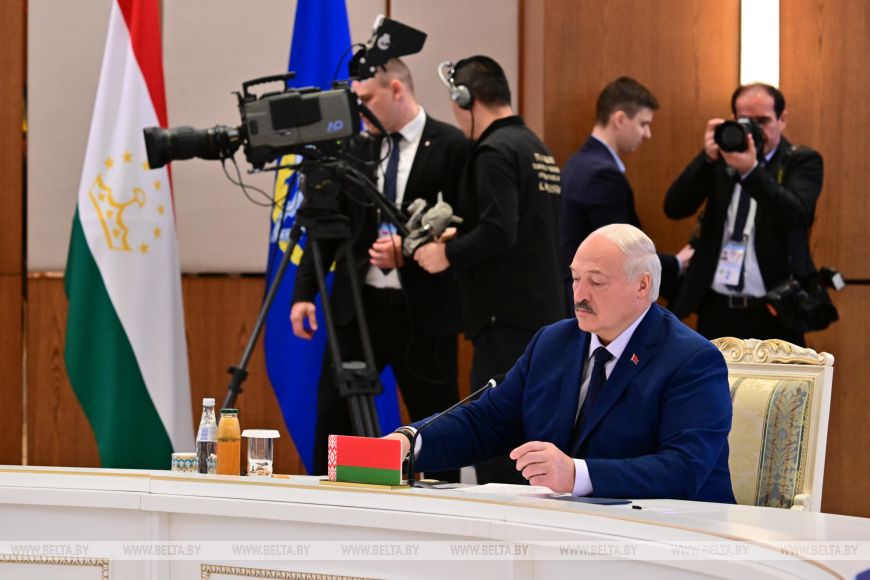
The head of state said exactly the same in Astana: “It is sad that the West uses all its resources to deal with fake problems that it creates itself. In the modern world there are a great number of transnational challenges and threats that can be tackled by joint efforts only.”
Aleksandr Lukashenko cited the climate agenda, which “Western politicians turned into business a long time ago”. “The trendy European Green Deal is nothing more than an unfair competition project that works exclusively in the interests of Western countries that are primarily responsible for air pollution. By the way, many are already saying this out loud,” the president said.
Approved in 2019 the European Green Deal is an economic development strategy that aims to achieve carbon neutrality by 2050 and break the dependence between economic growth and resource consumption. However, there is no consensus on it even within the EU, which causes heated debate. “Defended by some, criticized by others, misunderstood by many, Europe's Green Deal on climate change has generated heated debate across the EU,” Euronews wrote in its article in May this year.
On terrorism, AI and cybercrimes
Aleksandr Lukashenko highlighted other issues, including international terrorism.
“Terrorist organizations use any opportunity to grab attention. Meanwhile, Western countries refuse to cooperate in good faith with our organization in the fight against this evil,” the Belarusian leader noted.
The president expressed concern about the prospects for the uncontrolled use of artificial intelligence, which is increasingly exploited to plan and solve military tasks. “With the ability to self-learn, this tool might destroy humanity if it gets out of control,” he said.

Among the issues, the president also mentioned the topic of information security and cyber threats. “On the one hand, modern technologies create thousands of new opportunities and prospects. On the other hand, they give rise to many risks and threats: fake news, disinformation, attacks on critical infrastructure,” Aleksandr Lukashenko pointed out.
He stated that the West is not willing to discuss these and other important issues. “As we often say, any crisis creates new opportunities. It would be a sin not to use them,” the head of state stressed.
On inevitable multipolarity
Less than a month ago Belarus hosted the 2nd Minsk International Conference on Eurasian Security. This forum is designed to demonstrate the desire of Eurasian states to change life for the better. “Multipolarity is a historical inevitability,” Aleksandr Lukashenko stressed.
According to the president, the idea of the Charter of Diversity and Multipolarity in the 21st century proposed by Belarus is aimed at forming a just world order based on the principles of equality, sovereignty, indivisibility, security and respect for the diversity of development paths.
On the CSTO's place in the new security architecture of Eurasia
“The key to solving problems and creating effective security mechanisms lies within our Eurasia with its thousand-year history of coexistence of different peoples, interpenetration of cultures and civilizations. In the new paradigm of international relations, the CSTO should become one of the military and political pillars of the emerging security architecture of the Eurasian continent, setting a trend for the entire regional security agenda,” the Belarusian leader said.
Aleksandr Lukashenko noted that the CSTO has amassed certain experience and needs to share it with other international organizations in the Eurasian space.
On Belarus' initiatives on new weapons control
Aleksandr Lukashenko mentioned a number of new tasks that the allies will have to address when building a new architecture of Eurasian security and strengthening the CSTO.
First, the president considers it important to strengthen the interaction between international organizations working in Eurasia. “In this regard, I propose to think about organizing a meeting of senior officials of the regional organizations, including ASEAN, the CSTO, the SCO, the CIS, the CICA, and the Gulf Cooperation Council,” he said.
The president noted that there is already a proven mechanism of regular meetings of the leaders of the CSTO, the CIS and the SCO. “Why not try to expand this format in order to exchange unique interregional experience? We are ready to hold this meeting in Belarus should you agree to this proposal,” Aleksandr Lukashenko said.
“Such meetings can also discuss the ways of intensifying cooperation between the CSTO and the SCO on international security issues in line with the decision of the Collective Security Council to develop cooperation between the CSTO and the CIS and the SCO. The Shanghai Cooperation Organization has a broad agenda on ensuring security in the Eurasian space, and this potential can be used,” the president added.
Secondly, the president believes it necessary to tackle the issues of artificial intelligence and deepen cooperation in information security within the framework of the CSTO.
“The idea is not new. However, we have not yet begun to take practical steps within the organization. Meanwhile, Western countries are already vigorously dealing with it,” Aleksandr Lukashenko said. “We also need to think about how to increase the practical impact of the 2017 CSTO agreement on cooperation in information security. We must keep pace with the rapid development of cyber technologies in order to effectively respond to the challenges and threats to the security of our countries.”
The third task is to maintain control over new types of weapons. “We are looking at new types of deadly weapons capable of destroying all of humanity. This arsenal has already been amplified with laser, hypersonic, quantum, electromagnetic and other advanced developments,” the head of state remarked.
“In our opinion, the CSTO can and should spearhead efforts to create a common legal mechanism to keep such weapons under control in the future. This should be done now. At least, we should start,” Aleksandr Lukashenko said.
What decisions were made in Astana?

The leaders of the CSTO member states adopted a declaration and signed 14 documents. The Declaration of the CSTO Collective Security Council takes a special place in the list of documents. It reflects the dynamic development of the international military and political situation.
“The declaration outlines the organization's position on pressing international security issues, considering the fundamental principles of the organization's activities, and reflects the main approaches of the CSTO member states to international interaction and cooperation aimed at strengthening global and regional security,” the CSTO secretary general said.
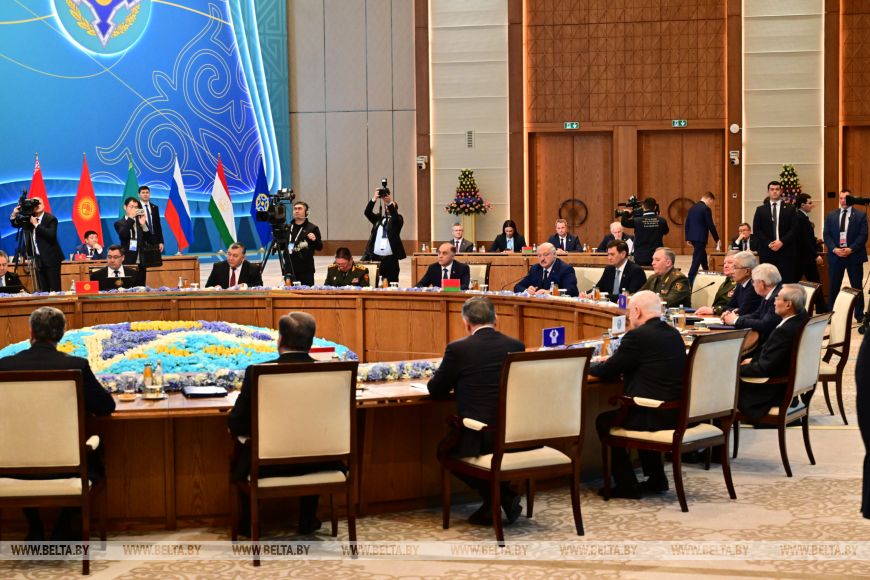
The leaders of the CSTO member states adopted a statement of the CSTO Collective Security Council on the 80th anniversary of the Victory in the Great Patriotic War.
In order to further develop the collective security system, the CSTO leaders made a number of decisions aimed at further strengthening alliance, coordinating foreign policy and equipping the CSTO Collective Forces. The parties approved the CSTO Special Interstate Policy for strengthening sections of the Tajik-Afghan border which is set to be implemented in 2025-2030.
The participants spoke highly of the chairmanship of Kazakhstan in the CSTO. Kyrgyzstan takes over the CSTO chairmanship from Kazakhstan on 1 January 2025. In this regard, President Sadyr Japarov of Kyrgyzstan outlined the priorities for the chairmanship period.
The next meeting of the CSTO CSC will be held in Bishkek in the fourth quarter of 2025.
Will Belarus have the Oreshnik missile?
When the formal part of the summit was over, some journalists managed to get into the hall while the heads of state were still there. It was a good opportunity to get an exclusive interview. As for the president of Belarus, you don’t have to ask him twice – Aleksandr Lukashenko is always ready to answer any question.
So, let’s return to the above-mentioned topic of NATOfication. The head of state was asked whether the demonstration of the capabilities of the Russian missile system Oreshnik should cool down those who brought the world to the brink of WW3.
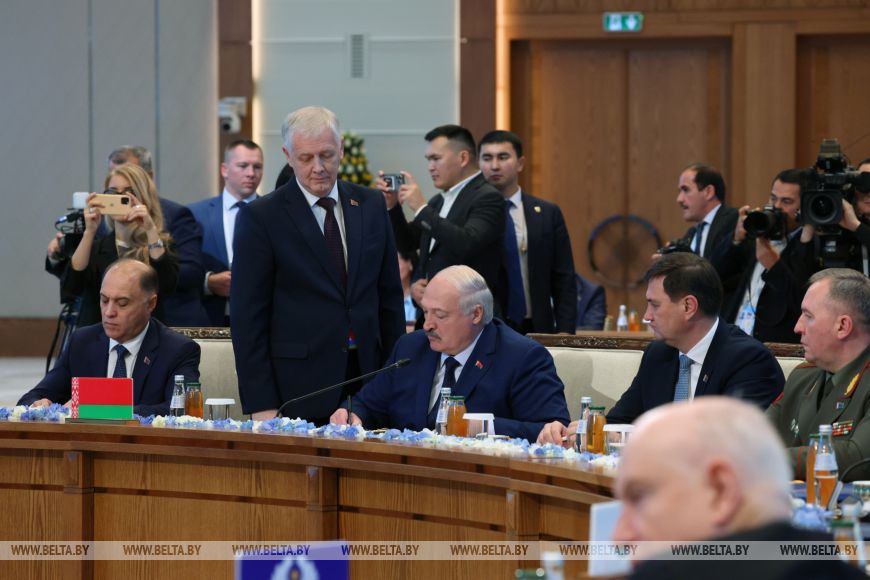
“It has already cooled them down. We have seen this right away in the media. True, there is no longer a single line, everything is in disarray. This suggests that they are a little confused,” the head of state noted. “But the weapon is good. Not nuclear but comparable in terms of power to nuclear weapons. Without penetrating radiation, without contamination of the area and facilities.”
“It did produce a strong impact on the so-called international community and especially on those who thought that everything would be fine. It won't,” the Belarusian leader stressed.
Answering a clarifying question whether it is important for the security of the Union State, the president said: “Naturally, it is. I asked jokingly the elder brother [Russian President Vladimir Putin]: ‘Places for deployment are ready. When?’ - ‘We'll think about it [Vladimir Putin replied].”
The Russian president also spoke about the new Russian weapon at the summit. He said that there are no analogues of the Oreshnik in the world, and there will not be any anytime soon. According to Vladimir Putin, Russia “was forced” to test the newest hypersonic missile system Oreshnik in a non-nuclear version in combat conditions in response to Western missile strikes on Russian territory.
At the request of the CSTO leaders, the Russian head of state unveiled details about the Oreshnik system: “Dozens of homing warheads attack a target at a speed of Mach 10 - about 3 km/sec. The temperature of the striking elements reaches 3,000°C. If my memory serves me right, the temperature on the surface of the Sun is 5,500-6,000°C. Therefore, everything that is at the epicenter of the explosion is divided into fractions, into elementary particles, essentially turning into dust. The missile can even hit highly protected objects located at great depth. According to military and technical specialists, in the case of a massive use of these missiles in a cluster, in one strike, the power of this strike will be comparable to the use of nuclear weapons. Although the Oreshnik is certainly not a weapon of mass destruction.”




